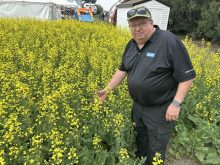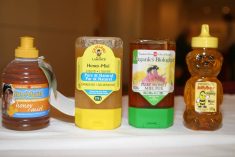Once Novozymes finalizes the purchase of one of its competitors, it will become the world’s largest provider of plant inoculants.
The Danish company is acquiring EMD/Merck Crop BioScience for $275 million US subject to regulatory approvals. EMD produces biological growth enhancers and nitrogen inoculants primarily for soybean and pulse crops.
“The acquisition of EMD/Merck Crop BioScience strengthens our global position in the growing industry for agricultural biologicals, providing products that enhance the natural growth and yield of crops,” said Steen Riisgaard, chief executive officer of Novozymes.
Read Also

First annual Ag in Motion Junior Cattle Show kicks off with a bang
Ag in Motion 2025 had its first annual junior cattle show on July 15. The show hosted more than 20…
The company will be integrated into Novozymes’ Biologicals BioAg Group, a division of the business that started with the 2007 purchase of Philom Bios, a Saskatoon inoculant company.
Trevor Thiessen, president of the BioAg group, said Saskatoon will remain as one of the group’s three regional offices. The other two will be in the United States and Argentina, where EMD did most of its business.
“Our commitment hasn’t changed. We continue to be very, very committed to bringing new technology and innovation to the western Canadian farmers,” he said.
Thiessen expects the deal will result in a greater selection of inoculant products for western Canadian farmers that will hit the market sooner than if the two businesses hadn’t merged.
“One of the drivers for us in the transaction was this gives us a much bigger global scale and presence that will facilitate our ability to develop new products,” he said.
The acquisition immediately doubles EMD’s offerings to approximately 60 products, although there will be some overlap that has to be sorted out. Some EMD products western Canadian growers may be familiar with are Cell-Tech, Nitragin and Soil Implant.
Thiessen said Novozymes will be able to use its more robust research and development network to get some of the products in EMD’s research pipeline to farmers faster. But it will take awhile to sort through what’s in the pipeline.
“Within the next two years, we would hope to see some of these new technologies come to market,” he said.
Novozymes would like to use its new research and development clout to develop products for other crops of importance to Western Canada.
“Maybe canola would be one of the first ones we would start with and then look also at wheat,” said Thiessen.
He downplayed any talk about the deal reducing competition and increasing prices in the inoculant market.
“There’s still a good degree of healthy competition in the industry. Becker Underwood is a very good and strong competitor of ours,” said Thiessen.
“We recognize that getting short-term wins by trying to increase price or take away choice for growers doesn’t ultimately allow you to help farmers grow better crops.”
Thiessen acknowledged that the $275 million price tag to acquire EMD may seem high to some people considering the entire inoculant market is worth an estimated $250 million annually.
But EMD also produces products for the $100 million annual biological growth enhancer market.
The company is expected to sell $60 million of product in 2010 and its annual growth rate has averaged 15 percent over the last seven years.
Thiessen said the inoculant and growth enhancer markets are expected to more than double in the next seven to eight years as farmers attempt to become more efficient users of fertilizer and other inputs.
Products produced by EMD will continue to be sold under the EMD brand in 2011 but they will gradually transition to the Novozymes name as the company works through some legal issues.
The takeover is expected to be completed some time between early February and late May 2011.
What is Novozymes?
•Novozymes started up in the mid-1920s making insulin.
•The Kroghs founded Nordisk Insulin laboratorium, but a disagreement in the company led to the founding of a competing company, Novo Terapeutisk Laboratorium (Novo).
•In 1952, Novozymes began producing enzymes by fermentation using bacteria.
•In 1962 the first detergent enzyme was marketed.
•In 1984, Novozymes released the first enzyme produced by GMOs. The enzyme, Lypolase, dissolved fat making it effective for treating industrial grease traps or removing gravy stains in the laundry. It is also involved in nanotechnology research.
•The two companies combined in 1989 to form Novo Nordisk A/S.
•In early 1999, the company demerged to form Novo Nordisk and Novozymes.

















